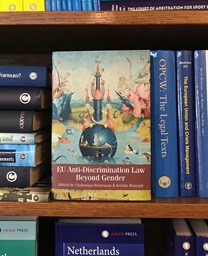New Publication: EU Anti-Discrimination Law Beyond Gender
Published 15 November 2018
In the new book "EU Anti-Discrimination Law Beyond Gender" the authors assess the rise, successes, and pitfalls of EU anti-discrimination law regarding race and ethnicity, religion, sexual orientation, disability, and age. “Despite all its flaws, the EU offers one of the highest standards of protection in comparative anti-discrimination law”. © Shutterstock.
A new book edited by Asser senior researcher Dr Uladzislau Belavusau and Prof. Kristin Henrard from Erasmus University in Rotterdam, has just been published in Oxford by Hart-Bloomsbury Publishing. Their volume “EU Anti-Discrimination Law Beyond Gender” evaluates the progress made in the field of European anti-discrimination law since 2000.
In the book, the editors, in cooperation with fifteen leading scholars, assess the rise, successes, and pitfalls of EU anti-discrimination law since 2000. They cover issue areas of race and ethnicity, religion, sexual orientation, disability, and age. In his Foreword to the volume, Prof. Koen Lenaerts, President of the Court of Justice of the EU, stresses that “the book is a hugely valuable contribution to the existing literature on EU anti-discrimination law and an outstanding piece of scholarly work”.
 Before 2000, gender equality was the only protected ground of discrimination. In 2000, two EU Equality Directives added new grounds. The Race Equality Directive focuses on race and ethnic origin, while the Framework Equality Directive covers religion, sexual orientation, disabilities and age. Prof. Christa Tobler of Leiden and Basel Universities explains that, “despite all its flaws, the EU offers one of the highest standards of protection in comparative anti-discrimination law… understanding and navigating it is helped immensely by the kind of guide provided by this book.”
Before 2000, gender equality was the only protected ground of discrimination. In 2000, two EU Equality Directives added new grounds. The Race Equality Directive focuses on race and ethnic origin, while the Framework Equality Directive covers religion, sexual orientation, disabilities and age. Prof. Christa Tobler of Leiden and Basel Universities explains that, “despite all its flaws, the EU offers one of the highest standards of protection in comparative anti-discrimination law… understanding and navigating it is helped immensely by the kind of guide provided by this book.”
The volume is available to order here.
Dr Belavusau is part of Asser’s research strand Human Dignity and Human Security in International and European Law. This research strand adopts a human rights approach to global challenges in the field of counter-terrorism, international criminal law, international humanitarian law, international trade, environmental protection, European private international law, and the law of EU external relations. It examines what it means to safeguard human dignity - also in relation to human security - in these areas.
